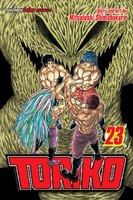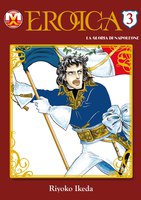RIGHT TURN ONLY!!
Cooking Nightmare
by Rebecca Silverman,

I had one of those weeks – you know the ones. The weeks where you can't win for losing, you can't get out of your own way, and your cat freaks out while you're holding him, scratches the hell out of your arm, and you have to go on the one antibiotic you aren't allergic to, which necessitates you staying out of the sun. (Or maybe that last part's just me.) Anyway, let's just say that I am pleased to have put last week behind me.

TORIKO
Vol. 23
(by Mitsutoshi Shimabukuro, Viz, $9.99)
FROM THE BACK COVER:
In a savage world ruled by the pursuit of the most delicious foods, it's either eat or be eaten! While searching for the tastiest foods imaginable, Gourmet Hunter Toriko travels the world with his bottomless stomach, facing every beast in his way.
When the Four-Beasts is revealed to be a single giant monster that craves human flesh, Toriko and the Four Kings rush to the center of the Human World to stop it from eating the helpless populace. But as soon as they get there, it unleashes a toxic rain. While Komatsu cooks up a life-saving cure, the Four Kings pool their appetite for the ultimate combination attack!
REVIEW:
Ah, Toriko: the tale of manly men with major appetites and mad hunting skills – now with the Power of Friendship! While the ostensible theme of this volume is the fight against the Four-Beasts and its horrific transformation into a single monster, to say nothing of its attempt to wipe out humanity, at the book's heart is a message about working together to overcome adversity. This is seen not only in the cover image (replete with glistening muscles) and its attendant plot point, but also in Komatsu's race to combat the toxic green rain that the Four-Beasts unleashes on the human world. With only an hour to save everyone touched by the green rain, Komatsu's battle is just as urgent as the more physical one fought by Toriko, Zebra, Coco, and Sunny. I actually found it to be the tensest part of the volume. We're used to Toriko facing life or death situations with only his appetite and physical skill, but generally the danger is only to himself and maybe three other people. Komatsu's got to save the entire world in under an hour.
Actually, the whole volume is pretty tense, with barely any time for Shimabukuro to put in jokes – the closest we come is Toriko's stomach gurgling during the battle, and that turns out to be a motivating factor – and inspiration – in defeating the Four-Beasts. The art can get very busy, much moreso than usual, during the big battle scenes, and Rin being summarily told that she needs to go do something that isn't fighting is a bit of a disappointment, although pretty understandable under the circumstances. But the excitement and tension keep all these niggling complaints in the background, and Shimabukuro's reminder of the mostly forgotten fact that someone set the Four-Beasts on our heroes makes for an ending that doesn't let us get too comfortable. This monster is beaten and eaten, but there's still plenty for Toriko to do.
RECOMMENDATION: Buy it. This is an exciting book, and honestly, Toriko's just a lot of fun anyway.

ALICE IN THE COUNTRY OF JOKER: NIGHTMARE TRILOGY: DREAM BEFORE DAWN
Vol. 1
(by QuinRose and Job, Seven Seas, $13.99)
FROM THE BACK COVER:
SWEET DREAMS IN THE SEASON OF LIES
It's April season in the Country of Joker. Wonderland is split into domains of summer, fall, winter, and spring. Faces from the past have returned. And Nightmare, Alice's employer, is much more than he seems. Frail, sickly, and more than a little ridiculous when dragged out into the waking world, Nightmare still possesses surprising secrets and hidden talents. But Alice will find that being Nightmare's champion is harder than it looks...especially when it means dealing with the ringmaster of April Season, Joker himself.
Explore the mysteries of April season, where everything is upside-down, in the first volume of The Nightmare Trilogy: Dream Before Dawn!
REVIEW:
I'll admit it – when I saw that this volume was drawn by Job, artist of the previous stand-alone Nightmare volume, I was not pleased. This is because Job does not have an art style that is particularly attractive or even especially good – limbs are noodley, faces are frog-like, and characters are very hard to tell apart, even when we've been reading about them for years now. While the art is moderately improved from the last volume, this is still difficult reading in terms of visual coherency, feeling both very messy and somewhat amateurish when compared with other Alice volumes. The story is also sub-par, unfortunately. This volume feels much more like fan fiction than an official adaptation, with a random survival game and cruise serving as plot points. (There are southern islands in Wonderland? I didn't even know there was an ocean!) Characters appear to have been chosen at random to appear, with Julius serving very little purpose and Gowland feeling like a plot device. We see no one from Heart Castle, which feels odd. The one aspect of the book that really feels like it belongs in the official Alice cannon is Joker, who is sufficiently creepy and mysterious as he toys with Alice's mind. The two short stories in the back of the book, one set in Hearts about Boris and the other set in Clover about Elliot, are actually rather better reads than the main story, particularly the Boris short, which focuses on his cat-like attributes. Also a higher point is that Job does a better job with color art than black and white, so the opening color pages are a real plus in more ways than one.
RECOMMENDATION: Skip it. This is a very weak entry into the franchise, with its poor art and ad nauseum reminders that Nightmare is the Caterpillar, to say nothing of the sparse plot. Don't be like me, compulsively collecting all Alice volumes and give this one a miss.

DAWN OF THE ARCANA
Vol. 13
(by Rei Toma, Viz, $9.99)
FROM THE BACK COVER:
Princess Nakaba of Senan and Prince Caesar of Belquat only married each other for the sake of peace between their two warring countries, but the two grow to care deeply for each other over time. Just when it looks like Nakaba and Caesar can finally unite Senan and Belquat, however, Nakaba's beloved attendant Loki asks that she hand Senan over to him! Will Nakaba give in to Loki's demands? And what life-changing secret will Nakaba's Arcana of Time power reveal during the height of her distress?
REVIEW:
It was somewhat of a surprise to see this trumpeted as the final volume, as volume twelve did not feel like things were winding down. Nevertheless, this is in fact the end of Dawn of the Arcana, and it meets with mixed success. On the plus side, an event that Toma says she's been working towards from the beginning works well on an emotional level – this volume hits you, and hits you hard. In some ways it makes a mockery of the very powers that the characters have been learning to use, because what good are supernatural abilities if they come too late and can't really make the difference that you want them to? While this volume doesn't quite hit “tearjerker,” it certainly does make it to “incredibly melancholy,” and Toma deserves a lot of credit for that. If the writing had been this emotional all along, Dawn of the Arcana could have been an amazing series.
Unfortunately at the end of the day it isn't. It's a good series, and this is one of the strongest books in it, intertwining triumph and loss in a skillful way. But it also rushes to that end, with the conclusion of the cliffhanger in volume twelve – Loki's demand for the kingdom of Senan – coming too quickly and time sort of flying along after that. No, we don't need to see every year that passes, but when Nakaba's hair goes from a braid just past her shoulders back to reaching her hips, you know that way too much has been skipped over. Perhaps the series got the axe, perhaps not, but the fact remains that Toma really rushes us through three chapters to get to where she wants to end things, at the expense of both the storyline and the characters.
But for all that? It's still very effective. Have the tissues ready if you're a sensitive reader.
RECOMMENDATION: Borrow it from a library or a friend. Parts of this are really well done, others, not so much. Both this volume and the series as a whole are better borrowed than bought.

CHI'S SWEET HOME
Vol. 11
(by Konami Kanata, Vertical, $13.95)
FROM THE BACK COVER:
Maternal Instincts
Nothing is more heartbreaking to a mother than losing a child. There is nothing that can replace family, and when one is lost at such a tender age it is even more distressing as uncertainty over the child's survival weighs heavily. So if fate offers an opportunity to be reunited with that lost child, it is a mother's duty to seize the moment and hope for a happy family reunion.
REVIEW:
It is difficult to be a cat owner (or owned by a cat, if you prefer) and not love this series. Chi's adorable antics are so true to life that you could substitute the name of your own kitten and get pretty much the same story. Case in point, this volume's opening scenes of Chi getting annoyed when Yohei stops playing with her before she's ready (possibly because he's unaware that they're playing) is one that might explain the feline phenomenon of the Random Cat Back and Forth Sprint. The story in this volume also voices the worry that some of us feel when we leave our cats for an extended period of time – when Mommy and Yohei go on a trip, Chi doesn't understand why they don't come right back, and her distress is upsetting for the reader as well. Her friend Cocchi's statement that they've been taken to a new home plays into the central story for the volume – that Chi had a home before she came to live with her present family. Which one is her real home: the one she's in now, or the one with her birth mother and siblings? If you've ever picked up a stray, this voices the niggling worry in the back of your mind – that someday, someone will see your kitty and say, “That's my cat!” This really is one of the great strengths of the volume, the way it uses Chi's feelings to dovetail into a person's, and the questions left dangling at the end of the book make for a tense wait until volume twelve. Of course, Chi's Sweet Home isn't all perfection. The side-by-side text of feline vocalizations and what they mean is tiring to read and feels a bit unnecessary, since we know that Chi isn't speaking in human words, and at times the parallels between human and feline are a bit heavy-handed.
RECOMMENDATION: If you're a cat person, buy it. This continues to be a thoughtful, adorable series that is also a great one for younger readers with its full-color pages and deceptively simple story. Being a cat fan, I can't say how well it would go over if you're ambivalent about them, but I suspect it would still be pretty enjoyable.

UQ HOLDER
Vol. 2
(by Ken Akamatsu, Kodansha, $10.99)
FROM THE BACK COVER:
Yukihime brings Tōta and Kurōmaru to UQ Holder HQ where they meet a whole team of immortals like them. As new recruits, they are shown a cold shoulder. To earn respect and become full-fledged members of UQ Holder, they must pass an initiation test. Without any warning, Tōta and Kurōmaru are dropped into a murky underground maze. Their mission: to escape from this dark monster-infested labyrinth within eight years. Tōta says he'll get out in a week. Can Tōta beat the odds?
REVIEW:
There's something kind of wonderful about a hero who never takes no for an answer and yet remains likable. Tota is that kind of protagonist, and while the rest of Ken Akamatsu's supernatural action manga is good in its own right, the fact that we're following Tota's adventures somehow makes it more fun. He takes everything in stride and simply uses his handicaps as a way to vault himself to the next level. Lose an arm? No problem – he'll just get it back. Need to rise in the UQ organization in order to see Yukihime? Bring on the work! This determination even leads to him using his feet instead of his hands at one point, which is physically unfeasible but certainly interesting. The plot itself is somewhat on the slow side, so it really is a good thing that Tota's so darn enthusiastic. The first half of the book involves Tota and Kuromaru passing the test to get into Yukihime's gang at all, which is really an excuse for Tota to power up. The second half has the two going on an assignment to protect a slum from unscrupulous land sharks/immortal hunters, which is also something of an excuse for Tota to power up. Not that this is a bad thing, and both halves contain some important information about the world and the characters (you find out what gender Kuromaru is for one), but plot and powering aren't particularly well put together. Add in a new character who may only exist to hate Tota – although probably not, and she does have one important moment with Kuromaru – and a lot of closely packed panels, and this isn't as good as it could have been. The series still looks to be in its building stages, however, so it's too soon to write it off yet based on a second volume that is just this side of mediocre.
RECOMMENDATION: Borrow it from a library or a friend. This is fun and has some good moments of both action and humor – it just isn't quite as balanced as it have been and the panels are a bit too crowded for easy reading.

KIMAGURE ORANGE ROAD
Vol. 1
(by Izumi Matsumoto, eManga, $5.99)
FROM EMANGA:
Teenage romance meets fantasy in this series as a love triangle develops between the main character, an indecisive esper named Kyōsuke Kasuga, Madoka Ayukawa, a mercurial and enigmatic girl with a tough past, and Hikaru Hiyama, Madoka's ditzy and energetic best friend. Kyōsuke falls in love with Madoka, and Madoka wants to return those feelings, but can not because of Hikaru's involvement with Kyōsuke.
Written by Izumi Matsumoto and serialized in Shueisha's Weekly Shōnen Jump, it was later adapted into an anime series broadcast on Nippon Television, animated by Studio Pierrot and directed by veteran animator Osamu Kobayashi with character designs by Akemi Takada and scripts by Kenji Terada, with Narumi Kakinouchi adding design work to the anime, as well as the opening and ending credits for episodes 1–8. In the mid-1990s the series was novelized as well.
REVIEW:
Ah, the memories – years ago AimEigo released the Kimagure Orange Road TV series on VHS and my friend developed an amazing urge to own a red straw hat, on the off chance that it would lead her to romance. Now that eManga is releasing the original 1984 manga, those who remember the anime have a chance to see where it began. And it very definitely began in 1984 – the art style is highly reminiscent of Rumiko Takahashi's Ranma ½ , lines and panels are cleaner and clearer than they are today, and the story is very old-fashioned in its views. It follows Kyousuke, a young man identified as an “ESPer,” although a better word would seem to be “teleporter.” He and his sisters keep having to transfer schools because younger sister Kurumi uses her powers indiscriminately, and they've just come to a new town. While climbing (and counting) a long set of stairs, Kyousuke meets Madoka Ayukawa, a beautiful girl whose red straw hat is blown off by the wind. Kyousuke falls for her immediately, and so is shocked when he gets to school the next day to find that she and her buddy Hikaru are the school delinquents. He sees them smoking behind the school and tells them to quit “or they'll never be able to have healthy babies.” This shocks the girls, and when Hikaru sees Kyousuke using his power to score a basket later, she falls for him hard. This sets up our love triangle, which is just getting off the ground at the volume's end.
Obviously that “healthy babies” line dates this manga. Attitudes seem practically puritan in terms of what makes a “good girl,” while at the same time Kyousuke is congratulated for becoming a man when Kurumi accidentally spreads a rumor that he's slept with Hikaru. Bad girls like Hikaru and Madoka go to discos to engage in “cheek time,” which it turns out means dancing cheek-to-cheek, while Kyousuke's twin sisters go to eat free food, even though just going could damage their reputations. It's a little troubling, but really more amusing than anything, given the series' vintage. Kyousuke is your basic shounen romance nice guy lead, and in a pleasant difference from many contemporary stories in the genre, no one beats on him for imagined crimes. Hikaru is rather an annoying, vaguely insipid character, but you also have to admire her determination to just go for the guy she wants, especially while Madoka and Kyousuke sort of hem and haw about it. Unfortunately the translation has some issues, which get worse as the volume goes on – missing words or letters and some suspect grammar. It's very readable, but it's a good thing that this is cheaper than the norm.
RECOMMENDATION: There's no borrow option with the digital stuff, but that's really where this lies, in its first volume at least. I suppose I'd tell you to buy it if you loved the anime or the shounen romance genre, but to skip it if it sounded at all dull to you from the review.

EIKOU NO NAPOLEON: EROICA
Vols. 1 - 3
(by Riyoko Ikeda, price and publisher vary by country)
FROM THE ITALIAN PUBLISHER:
Paris, 1795. Young Corsican officer Napoleon Bonaparte, to whom was entrusted the suppression of the Royalist Revolt, saves the National Assembly and is given the rank of Commander of the Army of the Interior. But one day this ambitious young man meets the beautiful widow Josephine de Beauharnais and, ingnorant of her frivolous lifestyle and voluble nature, falls in love.
REVIEW:
Everyone knows about Riyoko Ikeda's The Rose of Versailles, but what about its sequel? Eikou no Napoleon: Eroica only shows Oscar in flashbacks, but it continues the story of the French Revolution during the Napoleonic years, with the first three of twelve (or fourteen, depending upon the edition) volumes focusing on the first Italian campaign. It ties in to the previous series by bringing back Rosalie, Bernard, and Alain as minor characters, reminders of what once was and what it cost to get where they are today. The main focus this time is Napoleon Bonaparte, the Corsican officer who would later crown himself Emperor of France. He's a naive young man with great military prowess when we meet him, and something about him reminds Alain, who is still a soldier, of Oscar. The two meet while saving the National Assembly from a terrorist threat and Napoleon quickly takes Alain as his aide. There are some clear parallels drawn between Napoleon and Oscar, which are certainly interesting to look for – every time Napoleon charges to the front lines or does something risky, Alain has a moment of panic, remembering Oscar's demise, which seems to say something about Ikeda's own view of her heroine's military tactics. The books are divided between scenes of warfare and life in turn of the century Paris, a social scene dominated by the beautiful widow from Martinque, Josephine de Beauharnais.
Josephine's portrayal is what surprised me the most about this manga: Ikeda paints her as a bitch, unable to stay faithful to one man, and always willing to sacrifice someone for her own comfort and happiness. Having previously only read positive interpretations of the woman, this came as quite a shock, and could explain why this series is unavailable in French. We do, however, see her setting the fashion with her low-cut high waisted Empire dresses, running salons, and doing many of the activities she is known for...just in a negative light. She is basically shown as Napoleon's stumbling block and foil all at once – her poor behavior makes his good stand out. (The scene where she scandalizes the Italian women in their panniers and wigs with her Empire gowns is excellent, though.) This is not as well put together a series as The Rose of Versailles, but it is definitely still fascinating, if only for a view of Napoleon that I, at least, had never read much of. Ikeda's fondness for detail and research are evident on every page, making this worth it for the fan of French history...but maybe not those of Josephine.
DON'T WORRY! READ IT IN: Italian, Chinese
As an added fun bonus, every time my mother saw a volume of the Napoleon manga lying around, she thought I was reading something called “Erotica.” And on that note, I'll see you in September!
discuss this in the forum (7 posts) |